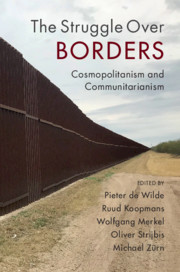Book contents
- The Struggle Over Borders
- The Struggle over Borders
- Copyright page
- Contents
- Figures
- Tables
- Contributors
- 1 Cosmopolitanism and Communitarianism – How Globalization Is Reshaping Politics in the Twenty-First Century
- Part I Domestic Impacts
- Part II Supranational and Cross-Level Analyses
- Part III Conclusion
- Appendices
- References
- Index
Part III - Conclusion
Published online by Cambridge University Press: 28 June 2019
- The Struggle Over Borders
- The Struggle over Borders
- Copyright page
- Contents
- Figures
- Tables
- Contributors
- 1 Cosmopolitanism and Communitarianism – How Globalization Is Reshaping Politics in the Twenty-First Century
- Part I Domestic Impacts
- Part II Supranational and Cross-Level Analyses
- Part III Conclusion
- Appendices
- References
- Index
Summary
“Globalization has transformed the inner workings of societies, and produced a new emerging cleavage between cosmopolitans and communitarians, affecting the working of our party system and democracy as a whole. The chapter summarizes the most crucial empirical findings of the book, moving from descriptive to more normative issues and asks: What does the struggle over borders mean for the quality of democracy? What understandings of democracy do the cosmopolitan and communitarian positions draw on? What are their flaws and virtues from a democratic point of view? Our core answer is the following: Both normative positions have become politically more prominent during the last decades of globalization, but both provide answers that exhibit considerable weaknesses when measured against the criteria of democratic quality. Nevertheless, both concepts have more room to forge compromises than the cosmopolitan and communitarian theoreticians themselves often assume. Cosmopolitan communitarianism or communitarian cosmopolitanism appear to represent the most promising compromises to overcome the democratic shortcomings of both pure narratives.”
Keywords
Information
- Type
- Chapter
- Information
- The Struggle Over BordersCosmopolitanism and Communitarianism, pp. 205 - 237Publisher: Cambridge University PressPrint publication year: 2019
